
Heating and Cooling Solutions
Summer in Bozeman, MT often means cranking up your A/C to escape the outdoor heat. However, that extra use of your air conditioner can often cause your monthly utility bill to skyrocket. You should never have to choose between enjoying the indoors and saving money on air conditioning. At Mountain Heating & Cooling, we are here to make every aspect of your home comfortable, including your summer energy expenses. To help you stay cool and save money on air conditioning during the summer, we’ve listed our top recommendations for how to take extra work off your air conditioner. Soon, you’ll be kicking back in your cool home and not thinking about bills or the heat!
6 Ways to Save Money on Air Conditioning
1. Check Your Windows and Blinds
To save money on air conditioning, let’s start with your windows. According to the U.S. Department of Energy, heat gain and loss through windows are responsible for 25%-30% of heating and cooling energy use in residential homes. Older windows can cause your home to absorb more heat than newer models. If your existing windows are not in good working condition or are outdated, replace your existing windows to improve efficiency. You can even tint your windows for extra help in blocking sunlight. While there is an upfront cost involved, in the long run, you’ll make up for it with lower utility bills.
Poorly sealed windows can also be the culprit of higher utility bills. Windows without proper sealing let excess hot air in your home and let the cool air out, making your A/C unit work overtime. Caulking the leaks or cracks and weather-stripping your windows can help trap cool air in your home.
Installing blinds or curtains over your windows can also help block out excess sunlight so you do not need to run your air conditioner as frequently. In fact, Christina Kielich, spokesperson for the U.S. Department of Energy, says “When completely closed and lowered on a sunny window, highly reflective blinds can reduce heat gain by around 45%.” To start, try using light-colored window treatments. Lighter hues tend to deflect the sun’s rays more than darker colors. Hang the shades as close to the window as possible to block outdoor heat from radiating inside.
2. Update Your Thermostat Habits
Your thermostat is one of the best places to start optimizing your home’s HVAC system for the summer. Firstly, it’s crucial to not leave your A/C on full blast all the time. Instead of turning off your A/C completely, it is best to set your temperature within 4 degrees Fahrenheit of where you want it when you are out of the house. When your home’s ambient temperature increases on a hot day, all of your home’s surfaces collect heat. These surfaces need to be cooled and rooms dehumidified as part of the cooling process. It is very difficult to cool a hyper-heated home. If your home is at a reasonable temperature when you’re away, you’ll get enormous savings and quicker recovery of cooler temperatures when you return. Contrary to “what Mom and Dad told you”, a constantly running air conditioner will cost less to operate.
Installing a smart thermostat can help you better regulate your air conditioning and save money at the same time. Smart thermostats allow you to program the thermostat to the desired temperature and automatically adjust when you are out of the house or at set times of your choice.
3. Get Your Cooling System Serviced
Scheduling regular air conditioner maintenance is one of the biggest ways to save money on air conditioning. A/C units that are clogged with dirt and debris make your HVAC system work harder than it needs to. This excess use of energy not only skyrockets your utility bill but it puts extra strain on your air conditioner. This can lead to early repairs or even A/C failure. We recommend the following:
- Regularly clean and replace your air filter every few months.
- Tidy the area around your air conditioning unit.
- Have a technician clean out your HVAC system before and after the summer.
- Remove or trim overgrown plants around your outdoor condenser.
4. Use Fans Whenever Possible
Fans are an excellent way to keep cool during the summer months in Montana. Fans can make the indoor temperature feel six to seven degrees cooler in a room, whether you use a ceiling fan or other type of circulating fan. Just remember to turn off the fan when no one is enjoying it. Otherwise, you will waste excess electricity.
5. Reduce In-Home Activities that Produce Heat
Did you know that microwaving or, better yet, barbequing your food instead of cooking it on your stovetop can help you save money on air conditioning? Activities that generate a lot of heat in your home can cause excess heat to build up, making your air conditioner work harder and longer. From cooking on the stovetop to running the dishwasher to using the clothes dryer, try to save these activities until after dark when temperatures have dropped.
6. Invest in an Energy-Efficient Air Conditioner
It’s important to look past your summer utility expenses and consider long-term energy savings. In the long run, a new energy-efficient air conditioner could save you more money than making do with an energy-guzzling A/C unit. While a new air conditioner may cost more money up-front, newer units are more energy-efficient, which can make them less expensive to operate over the years. As an alternative to a straight air conditioner, an air source heat pump can serve as your air conditioner during the summer and primary heating resource during shoulder seasons and winter—just ask us how!
When choosing an air conditioner, double-check that the unit is ENERGY STAR certified and that it has a SEER rating that carries the added benefit of a Montana State Energy Credit. An air conditioner with an ENERGY STAR stamp of approval means it meets the Environmental Protection Agency’s (EPA) standards for using less energy. The higher the ENERGY STAR rating, the more energy-efficient the air conditioner is. SEER rating (Seasonal Energy Efficiency Ration) is the air conditioner’s cooling output divided by the total energy used in a cooling session. Like ENERGY STAR ratings, the higher the SEER rating, the better the energy efficiency. The top air conditioner brands we recommend for energy efficiency are Trane and Mitsubishi Ductless.
If you need a hand selecting an energy-efficient air conditioner for your home or business, we’re here to help and would love to talk to you. Our team can provide a complimentary in-home comfort assessment and specifications of the different units and make our recommendations for which model fits your home best. A new air conditioner installation is a major decision, so we want to provide all the information you need so you feel confident in your choice.
Need a Hand Getting Your Home Summer-Ready?
Whether you need repairs or would like a hand selecting the right Trane air conditioner for your home, reach out to our team for tips on how to save money on air conditioning. Our Bozeman air conditioning specialists take special care to ensure your home is safe, energy-efficient, and comfortable during every season. From replacements to general maintenance, our technicians cover every HVAC need with the utmost professionalism and respect. Fill out our contact form to schedule an appointment, or give us a call at (406) 586-4007.
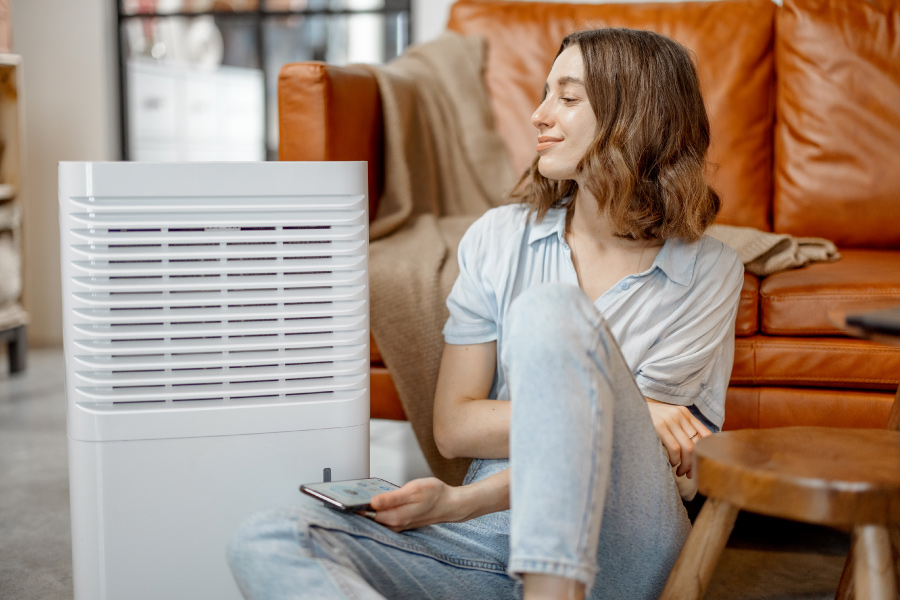
Heating and Cooling Solutions
Keep Your Air Safe & Clean During WildFire Season
Wildfire smoke is a danger, even if the fire is hundreds, maybe thousands, of miles away from Bozeman, MT. Air quality diminishes during wildfire season. To protect yourself and your home, it’s crucial for your home to have an air filter for wildfire smoke. A simple filter swap or installation can be the difference between facing negative health impacts and enjoying a safe and clean home. Let’s review the facts about wildfire smoke and why it’s important for your home to have air filters for forest fire smoke.
The Importance of a Wildfire Particulate-Free Home
In Montana, forest fires are becoming an increasingly frequent problem, with causes including drought, climate change, and fuel buildup in unburned forests. Forest fire smoke contains a mix of gasses and fine particles from burned wood and other organic materials. The lightweight nature of wildfire particulates means it can be swept into the jetstream and spread for thousands of miles. Fires on the west coast have the potential to decrease air quality on the other side of the continent.
These fine particles caused by wildfire smoke pose a significant threat to our health, especially our lungs. Impacts of inhaling wildfire smoke include coughing, phlegm, wheezing, and difficulty breathing. People often experience a range of both physical and mental symptoms, from headaches to fatigue and irritability [1]. Long-term exposure has been linked to respiratory infections, asthma, and an increased risk of death [2]. While some people experience a higher risk of smoke-related health impacts, everyone should be prepared to decrease their wildfire smoke exposure.
Tips for Improving Indoor Air with an Air Filter for Wildfire Smoke
For Bozeman homeowners with an HVAC system, there are easy steps to take that can improve the air quality during the smokey season. In fact, your home’s central air system is one of the simplest, most effective, and most affordable ways to filter indoor air.
Shut Off Outdoor Air Intake
In most home HVAC systems, the air filter is located before the blower motor, between the furnace’s heating aspect and an air duct. Typically, a heating and cooling system can shut off outdoor air intake and recirculate (and filter) indoor air. During wildfire season, this keeps smoke out while continuously filtering indoor air. If you’re unsure how to shut off the outdoor air intake, our team can send a technician to show you the filtration capabilities of your home’s HVAC system. They can also help adjust it to ensure your indoor air quality remains high.
Upgrade to a High-Efficiency MERV Air Filter
Improving the air quality in a home is often as simple as upgrading your indoor air filter. Some home air systems use low-efficiency air filters with a Minimum Efficiency Reporting Value (MERV) rating of 1–4. A medium efficiency filter (MERV 5–8) is sufficient for common indoor pollutants like pet hair and dust bunnies. But come wildfire season, we highly recommend using air filters with a MERV rating of 13-16, a true high-efficiency filter. Filters with a MERV value of 13 or above can remove up to 95% of all wildfire smoke particulates. While most home HVAC systems will accommodate a MERV filter of 13 or above without issue, some older systems may need a different model or a slight system modification.
Regularly Replace Your Air Filter
Regularly replacing your high-efficiency filter will help your HVAC system run better and improve your air. Smoky outdoor air conditions clog a filter faster than usual. To keep your air clean and reduce strain on the system during the high-use season, we recommend replacement around every three months. Our professionals can determine the right air filter, setup, and replacement frequency for your home.
Secure the Rest of Your Home
In addition to replacing and maintaining your HVAC air filters, there are other simple steps to take for a clean, safe home:
- Close doors, windows, vents, and dampers to reduce outdoor airflow.
- Don’t use bathroom fans when possible, as they can draw in the unfiltered, smoky air.
- Consider buying a plug-in air purification system if your system can not take a MERV 13+ rated filter.
- Clean your surfaces regularly with a wet cloth and damp mop.
Understanding the Air Quality Index (AQI)
The Air Quality Index (AQI) is a color-coded index used to report and forecast daily air quality. The Index measures the most common ambient air pollutants, including wildfire smoke. The higher the AQI, the more important it is to reduce exposure.
The AQI is typically low for most of the year in Montana, where we are less affected by urban pollution. Come wildfire season, it’s not unusual to see days and even weeks on end with the AQI between 101 to 200. This corresponds to “Unhealthy for Sensitive Groups” and “Unhealthy.” It’s important to be ready for the smoky season in advance by preparing your HVAC system with a high-quality air filter for wildfire smoke.
We Keep Your Indoor Air Safe
No matter what HVAC setup you currently have, Mountain Cooling & Heating can make the most of your system for a cleaner, healthier home. By choosing the best air filter for wildfire smoke, replacing filters regularly, and keeping your home closed off from outdoor particulate matter, you’ll be happy and healthy this wildfire season. To prepare your home for wildfire season, schedule an appointment with our team today. Our Bozeman-based HVAC experts can provide the necessary installations and recommendations to protect your home.
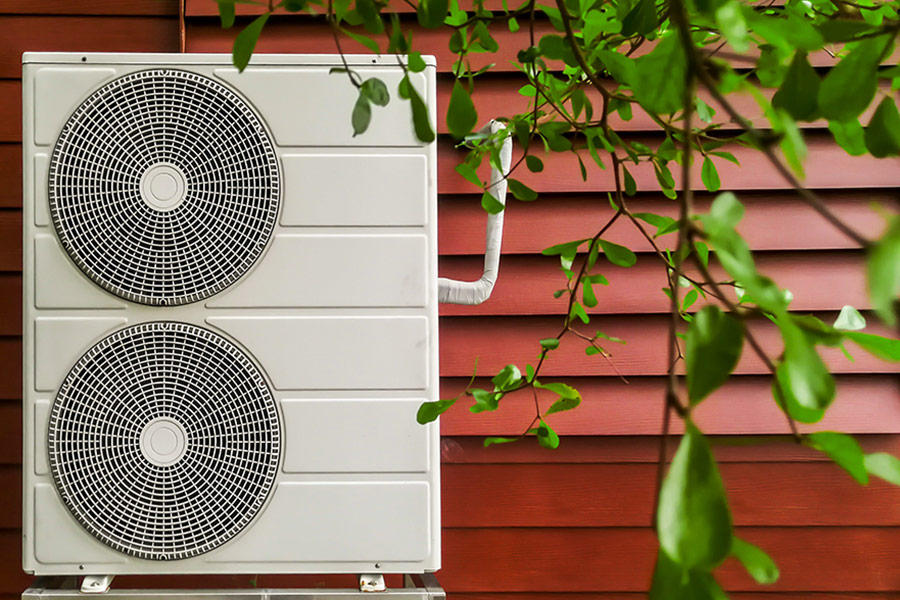
Heating and Cooling Solutions
It’s nearly impossible to imagine going without air conditioning, especially when the hotter weather hits. Air conditioners are a modern home staple, and they’re essential for staying comfortable in your home. Eventually, air conditioners start to wear out and need replacing. But what are the signs it’s time to replace your air conditioner? If you know when to replace your air conditioner, you may avoid the future discomfort of going without home cooling if your unit suddenly fails. Below, we list 8 reasons why it might be time to replace your home’s air conditioner unit.
8 Signs It’s Time to Replace Your Air Conditioner
1. Odd Noises Are Coming from the Unit
Is your air conditioner noisier than usual or making funny noises? Worn-out units tend to make more noise than newer units. Noises may include grinding, rattling, banging, etc. If the unit is blocked by dust and debris, sometimes a simple air conditioner repair appointment is all that’s needed. However, if the unit is old and multiple parts are wearing down, it may be time to replace the air conditioner entirely.
2. The Air Smells Strange
Your air conditioner should never emit odd smells. So if the air smells musty or moldy, call an HVAC technician immediately. Strange smells can be caused by dirty air filters, burned-out wire insulation, or mold and mildew buildup. Sometimes a simple cleaning and repair job can fix the problem. But if the air smells of smoke when you run your air conditioner, it may be time to replace your A/C unit before experiencing a costly and potentially dangerous breakdown.
3. Your Energy Bills are Higher
Have you noticed that your monthly energy bill keeps getting higher and higher? Your A/C unit may be the culprit. Older air conditioners have to work harder to keep your entire home cool, which can skyrocket your energy bills. Replacing your old air conditioner with a newer, energy-efficient model can help keep your monthly expenses down and keep your home comfortably cool.
4. Poor Air Quality in Your Home
Is your air conditioner not blowing cold air to the entire house? Is your home feeling more humid than usual? Have you noticed more dust on top of your furniture? These can be signs that you’re in need of an air conditioner replacement. Uneven cooling can be a sign your air conditioner is wearing out and can no longer perform to its previous standards. Also, if your home feels humid and is dustier than typical, this can signal your A/C unit’s ventilation is failing and needs replacing.
5. Your Airflow is Weak
Poor airflow can be a sign of clogged air conditioner filters and ducts. Regularly cleaning your filters and unclogging ducts can help improve your A/C unit’s efficiency. However, if your filters and ducts are in good condition, the problem may be your air conditioner. Having your air conditioner inspected by a technician can help you assess whether the unit needs to be replaced.
6. Unit Needs Frequent and Expensive repairs
If you find yourself constantly calling an HVAC technician for repairs, it might be time to invest the money spent for repairs into an entirely new A/C system. Rather than investing money in an air conditioner that is past its prime, a new system can help you save money in the long run.
7. Your A/C Unit is Over 10 Years Old
This is one of the most common signs it’s time to replace your air conditioner: old age! On average, air conditioners have a lifespan of 10-15 years. If your A/C unit is over 10 years old, it could be underperforming and using up more energy than needed, increasing your monthly energy bill.
8. Air Conditioner Uses R-22 Refrigerant
Air conditioners manufactured before January 2010 used a refrigerant called R-22 or Freon to cool the air inside the house. However, the Environmental Protection Agency (EPA) discontinued the use of R-22 because of harmful substances in it that can damage the ozone layer. Newer air conditioners use a more environmentally-friendly coolant called R-410A. To have your air conditioner checked to see if it uses R-22, reach out to a qualified HVAC professional for an inspection.
What Should I Look for in a New Air Conditioner Unit?
1.Energy Efficiency
Choosing an energy-efficient air conditioner can help you save on your monthly energy bill in the long term. Many air conditioner types are ENERGY STAR certified, which means they meet the Environmental Protection Agency’s (EPA) standards for using less energy. The SEER rating is also a measure of an air conditioner’s energy efficiency. Seasonal Energy Efficiency Ratio (SEER) rating is the air conditioner’s cooling output divided by the total energy used in a cooling session. The higher the SEER and ENERGY STAR rating, the better the energy efficiency.
2. Price
Your budget is crucial when deciding on an air conditioner unit. If you are looking for whole-home cooling, a central A/C unit is more effective for all-around cooling. They are more expensive, but systems with a higher price tend to be more energy-efficient. This can make them less expensive to run in the long term.
3. Size
You will need to make sure your A/C unit is the right size for your home. If you choose an air conditioner that is too large or small, it can be less efficient and use too much energy.
4. Cooling Power
British Thermal Units (BTUs) measure an air conditioner’s cooling capacity. The higher the BTU number means the more cooling power an air conditioner has. Speak with an HVAC technician to evaluate how many BTUs you need to cool your space.
5. Quality
You want to get the most out of your air conditioner, so choosing one that stands the test of time is important. Make sure your chosen air conditioner has reliable, well-made components so it can last you a long time. At Mountain Heating and Cooling, we recommend air conditioner brands like Trane, Lennox, and Mitsubishi for quality A/C units.
What is the Most Reliable Air Conditioner Brand?
We’ve found Trane to be the most reliable air conditioner brand on the market. As of 2018, Trane has been voted America’s Most Trusted HVAC Brand by Lifestory Research for four years in a row. Trane air conditioner units have up to 22 SEER ratings, and their signature quiet running fans measure at 4dB below competitor’s minimum. Many of their central air conditioners feature TruComfort technology, which lets the A/C unit automatically adjust the temperature while maintaining fan speeds to avoid temperature swings. On top of that, their air conditioner units are among the most durable in the industry. There’s a reason why their slogan is “You Can’t Stop a Trane!”
At Mountain Heating and Cooling, we’re certified Trane HVAC specialists, and we can properly assess which unit would be best for your home’s needs. Reach out to our Bozeman HVAC technicians today to learn more about what Trane air conditioner may fit your home’s needs best.
Next Steps
If your A/C unit is showing signs of wear and tear, reach out to our team to schedule an air conditioner inspection. Our Bozeman air conditioning specialists can take a look at your unit, determine whether it needs repairs or replacement, and make recommendations for what A/C unit fits your home’s cooling needs the best. Fill out our contact form to schedule an appointment, or give us a call at (406) 586-4007.
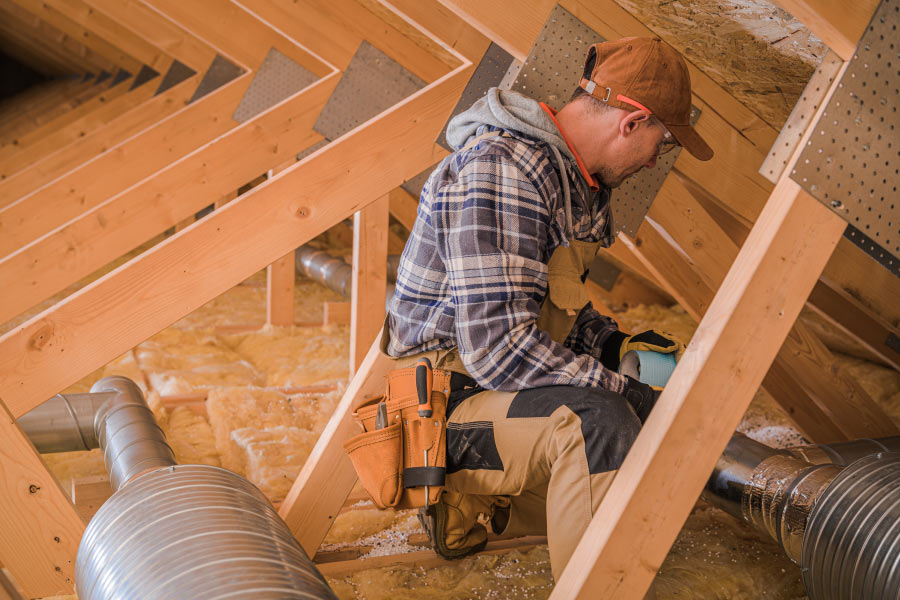
Heating and Cooling Solutions
Summer in Montana can mean both enjoying adventures under the sun and relaxing in the crisp indoors to escape the heat. If you’re looking forward to coming home to a cool, refreshing environment, you want to ensure your A/C unit is doing its job properly. One of the best ways to make sure your home is in summer shape is with a thorough air duct cleaning.
After a long fall and winter of running your heating, your HVAC system’s air ducts can be dirty and potentially damaged from the constant use. A/C duct cleaning and sealing keeps your home comfortable during the hotter months, supports indoor air quality, and reduces the energy your home can lose from an inefficient HVAC system. At Mountain Heating and Cooling, we offer full-scale air duct cleaning and repair services, and we love to share the tricks of our trade with customers. Read through our advice below on air duct cleaning, its benefits, and how to prep your air ducts for the summer—it’s just around the corner!
How Often Do Air Ducts Need Cleaning?
On average, it’s good practice to schedule an air duct cleaning service every three to five years. However, your location, climate, and HVAC system use could mean you need more frequent cleanings. Additionally, mold and illness can signal that your ducts need cleaning and, perhaps, even replacing.
Reasons to Clean Air Ducts
Like any cleaning service, air conditioning duct cleaning helps keep your home running smoothly and promotes health and wellness. Below are some of the top reasons why air duct cleaning benefits your and your home’s wellbeing:
- Reduces Respiratory Illness – Dirty air ducts can push dust particles and mold spores throughout your home and cause respiratory problems. Some illnesses that may signal your air ducts need cleaning include sinus infections, lingering coughs, and long colds.
- Clears Out Rat & Insect Infestation – Pests like rats and insects frequently nest in air ducts, so cleaning them out regularly can help prevent the spread of illness in your home.
- Removes Mold – Mold can be extremely harmful to your health if left unchecked. Mold spores can easily spread through your ductwork and contaminate your air, causing illness for you and your family. It’s important to remove mold as soon as possible and remove the source of the mold. HVAC technicians can help you take preventative measures to protect your ductwork from mold.
- Clears Buildup from Home Remodels & Renovations – Construction in and around your home generates excessive dust and dirt, which can contaminate your HVAC system.
- Improves Energy Efficiency – If your HVAC system is blocked by dirt and debris, it can either work harder than it should or stop working entirely. This extra effort on your HVAC system consumes unneeded energy, which can mean higher energy bills. Cleaning out your air ducts regularly helps keep energy consumption and monthly expenses to a minimum.
- Extend Your HVAC System’s Longevity – Having your air ducts regularly cleaned and repaired can extend their life expectancy. Removing debris can help prevent clogging issues that cause our HVAC system to work harder and wear out faster.
Hiring a Pro for Air & Heating Duct Cleaning vs DIY
While you can clean your air ducts yourself, hiring professionals will give you better, more thorough results. HVAC technicians have specialized knowledge of duct systems and what impacts duct efficiency. They can pinpoint problem areas that often get overlooked by untrained eyes. For example, comprehensive air duct cleanings not only involve technicians clearing out the aluminum ductwork running throughout your home but examining your diffusers, fan motor, girls, and heating and cooling coils.
Additionally, most homes aren’t equipped with the necessary cleaning tools to efficiently clear out air ducts–your home’s vacuum can only do so much! Professional HVAC companies have specialty vacuums built for air duct cleaning, scrub brushes, air skippers, chemical treatments, and even cameras to ensure the job is done correctly. If you would like to schedule an air duct cleaning appointment with Mountain Heating and Cooling, reach out to us today!
Double Down with Air Duct Sealing
To double down on making sure your air ducts are summer-ready, air duct sealing goes hand-in-hand with air duct cleaning. ENERGY STAR reports that nearly 20 to 30% of the air that goes through your duct system can be lost due to holes, leaks, and poorly connected ducts. This is where air duct sealing comes into play. Air duct sealing plugs any holes or cracks in your ductwork so air quality is consistent, healthy, and efficient. This can cause your utility bills to skyrocket and your HVAC system to work harder than it needs to. Usually, air duct sealant consists of an adhesive compound that fills any gaps and cracks in the ductwork. Many homeowners try to fix these leaks with duct tape, but it is not nearly as efficient as duct sealant. Tape gradually falls off over time, while duct sealing stays.
When you hire an HVAC technician for air conditioning and heating duct cleaning, they are typically able to locate any cracks or damage to your HVAC system while they are cleaning your system. This is extremely more efficient than tracking down duct leaks on your own, especially if you don’t have the proper equipment to fix the damage.
Ready for Expert’s Help? We’ve Got Your Back!
If you’re ready to get your home in summer shape, reach out to our team today. At Mountain Heating and Cooling, our HVAC professionals are well-versed in air duct cleaning and sealing, and we take the care and time to ensure the job is done right the first time. To schedule an appointment, drop us a line here to get the process started.
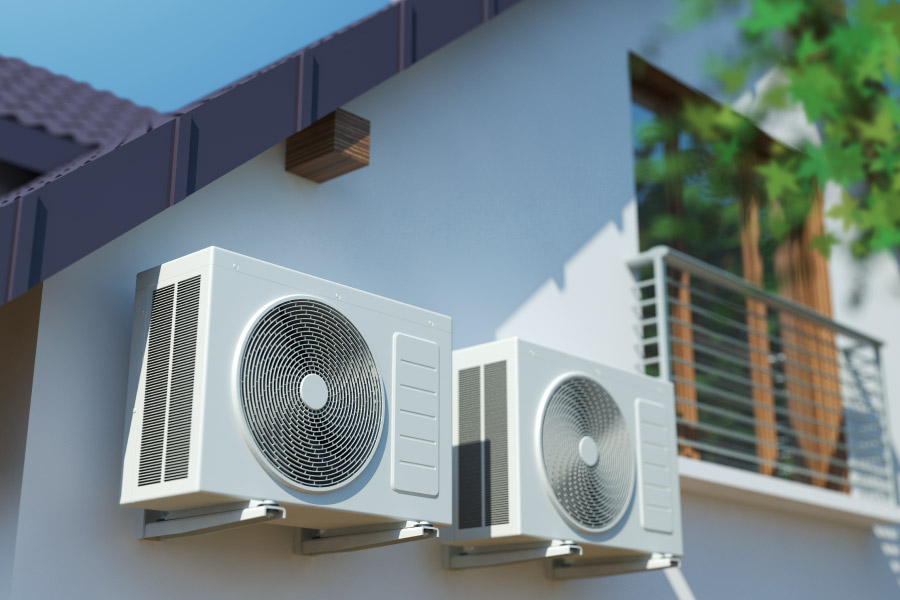
Heating and Cooling Solutions, Mountain Heating & Cooling News
As Montana starts to transition into spring, now is the perfect time to prepare for the upcoming heat. Once the summer hits, the last thing you want is for your A/C unit to be broken, in maintenance, or waiting to be replaced. Investigating your cooling options and installing a new A/C unit now can save you discomfort when we’re in the thick of summer. There are many air conditioner types on the market, so assessing their features and your cooling needs can help you pick the best unit for your home. We’ve laid out the different air conditioner types available and our top tips for selecting the right A/C unit for your needs.
Air Conditioner Types
Air conditioner types can be broken down into two larger categories: stand-alone units and split-system units. Here’s how they work:
- Stand-alone, or free-standing air conditioner units, are comprised of one device. This device contains both sets of metal coils used for cooling your home. One coil collects the heat from your home while the other dispels the heat outside.
- Split-system air conditioners use two devices to cool your home. One device (usually smaller and quieter) is located in the home, and the other device (usually bigger and noisier) is located outside. The cooling metal coil that collects heat is located in the inside unit, and the coil that dispels heat is in the outside unit.
Stand-Alone Air Conditioner Types
Portable Air Conditioner
These models are very popular for those looking for a single room air conditioner. They’re cheap, no-fuss units that can be easily moved around the room of your choice. Hot air collected by the unit is dispelled outside by an air pipe through an exterior wall or window. While they’re easy to move around, the air pipe needs to be moved as well, so they can take up extra floor space.
Window Unit Air Conditioner
These units are self-contained units that are either placed in a window or through a hole in the wall. One part of the unit faces indoors while the other faces outdoors. The part facing indoors collects the hot air, and the part facing outdoors expels the hot air outside. They come in a variety of sizes, and the bigger the unit, the more cool air it generates. You can normally install these units yourself and they typically have a low upfront cost. However, because of their singular, static locations, their cooling capabilities are limited to a single room.
Wall or Floor Mounted Air Conditioner
These air conditioner types can be both stand-alone or split-system units. Using strong supports, these units can either be mounted to the wall or floor with pipes going through the wall to release the hot air outdoors. If run continuously, the units and pipes can become warm to the touch if you are not careful. These units are typically better for single rooms, as the airflow is localized to one place. Floor mounted air conditioners typically cool the room quicker than wall mounted units, as the fan blows cool air at your level.
Split-System Air Conditioner Types
Ductless Air Conditioner
Ductless air conditioners, also known as mini split air conditioners, have become extremely popular over the years. They are great options for apartments or homes with no ductwork and those looking for a more permanent air conditioning solution than window air conditioners. They have two units that are installed on the interior and exterior of your residence. Tubing connects the two systems through the wall that separates them. These are efficient air conditioner types that can be installed in a single room or installed in each room for whole-home cooling. It can become pricy to install a mini split air conditioner in every room in the house, so central air conditioners are more optimal for whole-home cooling.
Central Air Conditioner
If you have a large home and want to cool many rooms at once, a central air conditioner is the best choice for your home. Central air conditioner units are able to cool multiple rooms in your home simultaneously and quietly. They use a split system setup, where the condensing unit is located outside and the evaporative unit is inside next to your furnace. They connect together using refrigerant tubing. The condensing unit generates cool air that is pushed into the evaporative unit. Then, the evaporative unit propels the cool air into your home through your furnace duct system. While central air conditioners are the most expensive option, they are extremely effective and efficient.
5 Tips for Choosing the Right Air Conditioner Type
- Energy Efficiency – Choosing an energy-efficient air conditioner can help you save money on your monthly energy bill in the long run. Many air conditioner types are ENERGY STAR certified, which means they meet the Environmental Protection Agency’s (EPA) standards for using less energy. The higher the ENERGY STAR number, the more energy-efficient an air conditioner is.
SEER rating is also a great measure of an air conditioner’s energy efficiency. Seasonal Energy Efficiency Ratio (SEER) rating is the air conditioner’s cooling output divided by the total energy used in a cooling session. Like ENERGY STAR ratings, the higher the SEER rating, the better the energy efficiency.
- Price – Your budget is king when deciding on an air conditioner unit. If you’re looking for cheap, easy cooling for a single room, a window air conditioner or portable air conditioner maybe your best option. If you are looking for whole-home cooling, a central A/C unit is more expensive but more effective for all-around cooling. Remember that systems with a higher price tend to be more energy-efficient, which can make them less expensive to run in the long term.
- Size – You will need to make sure your A/C unit is the right size for your desired location. If you choose an air conditioner that is too large or small, it can be less efficient and use too much energy. Consult with a professional HVAC technician to ensure you choose an A/C unit with the right dimensions.
- Cooling Power – British Thermal Units (BTUs) are the measure of an air conditioner’s cooling capacity. The higher the BTU number means the more cooling power an air conditioner has. You will need an air conditioner with the BTUs necessary to properly cool your space. Air conditioners can range from 5,000 to 36,000 BTUs, so speak with an HVAC technician to evaluate how many BTUs you need to cool your space.
- Quality – You want to get the most out of your air conditioner, so choosing one that stands the test of time is important. Make sure your chosen air conditioner has reliable, well-made components so it can last you a long time. At Mountain Heating and Cooling, we recommend air conditioner brands like Trane, Lennox, and Mitsubishi for quality A/C units. Typically, more expensive units are higher in quality, but it’s important to choose an A/C unit with specifications that match your cooling needs.
If you need a hand selecting a quality A/C unit, our highly-trained HVAC technicians understand the differences between various A/C units and can help you choose the best unit for your home. Chat with our technicians today.
Need an Expert’s Advice? We’ve Got Your Back!
Choosing an air conditioner unit can be a challenge, so it’s important to get an expert’s advice to ensure your home stays comfortable and operational during the summer. If you need a hand selecting an air conditioner unit before the warm months hit, schedule an appointment with our air conditioning specialists today. At Mountain Heating and Cooling, we take the time to understand your needs and budget so that you can make informed, confident decisions for your home. To schedule an appointment, fill out a contact form or call us at (406) 586-4007.
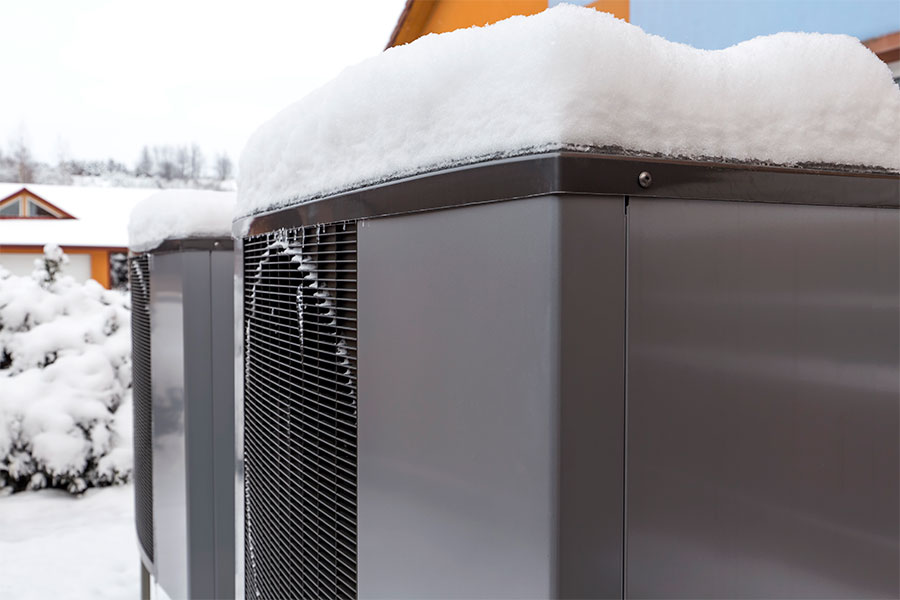
Heating and Cooling Solutions
It’s normal for frost to gather on your heat pump in winter weather. However, an excessive amount of ice can damage your heat pump system and cause it to freeze and stop working. The last thing you want in the Montana winter is to lose heat and be uncomfortable in your home. You can take steps now to get your heat pump winter-ready so you do not need to go without heat or call for an emergency heat pump repair. To prepare your home for the cold, we’ve laid out the warning signs of a frozen heat pump and the top tips for how to prevent a frozen heat pump in winter weather.
How Does a Heat Pump Work in Winter?
Heat pumps pull warm air from the outside and use it to heat your home in the winter. Even if it’s below zero, heat pumps can pull heat from the outside air. Heat pumps use a smaller amount of electricity to operate, which makes them less expensive to run than a gas furnace. Typically, heat pumps are partnered with a natural gas furnace option so that the furnace can kick on when the temperature drops below a heat pump’s threshold.
Heat pumps will often switch into defrost mode when the weather gets icier. The defrost mode helps keep ice from forming on the outdoor components of the system and heat the coils back up to the correct temperature. However, if the defrost system cycles on too often or fails to turn on at all, this can be a sign that the heat pump is frozen and faulty.
Warning Signs of a Frozen Heat Pump
There are several warning signs that your heat pump has frozen and needs a technician’s help to repair it. Warning signs of a frozen heat pump may include the following:
- The heat pump has been frozen over for a long period of time.
- The defrost cycle is not working or activating.
- Air is not entering the unit’s fins.
- The inner coil is completely covered in ice.
If your heat pump is frozen, it will take the experience and knowledge of an HVAC technician to fix the unit. At Mountain Heating and Cooling today, we know how to expertly repair and replace heat pumps, and we take extreme care in doing so. We value you and your family’s comfort, so we want to get your heat pump unit back to normal ASAP. Reach out to us today to schedule an appointment.
Tips for How to Prevent a Frozen Heat Pump in Winter
If your heat pump keeps freezing up in winter weather, taking preventative measures now can help save you time, money, and discomfort later. Below, we’ve listed the top ways for how to prevent a frozen heat pump in winter weather.
Clean & Change Your Filter
Air filters can become dirty and blocked over time, which can cause your heat pump to freeze in the winter. Regularly clean and change your air filter to make sure unhindered air is flowing through your heat pump.
Remove any Blockages
Having proper airflow to your heat pump is crucial to keep the fans and coils running optimally. To prevent blockages, clear away any leaves, debris, or snowdrifts that could be blocking your heat pump. If the coils on the heat pump are dirty, cleaning them can help prevent them from freezing.
Clear Away Ice Buildup
Freezing rain and icy weather can cause the top of your unit to freeze. If you notice ice buildup on your heat pump, clear it away immediately. You can remove ice buildup with water from a garden hose, but don’t use other methods to melt the ice, as it could damage your heat pump unit.
Keep an Eye on the Weather
Checking on your local weather forecast for snow and icy weather can help you know whether you may need to clear ice or snow off of your heat pump. If you get thick snowfall or an ice storm, make sure to take time to remove any blockages from your heat pump unit when it is safe to do so.
Schedule Regular Maintenance
Sometimes thermostats malfunction and can cause your heat pump to stop working, as well. Scheduling a regular maintenance check with an HVAC technician can help prevent malfunctions and resolve any issues that could cause your heat pump to break down in the future.
Frozen Heat Pump? Give us a Call Today!
Going without heat in your home is extremely uncomfortable, so call a professional HVAC technician to repair and maintain your heat pump today. At Mountain Heating and Cooling, we have 40 years of experience under our belt, so we’ve repaired many frozen heat pumps in winter weather during our years of service. We put your comfort first with our services and treat your home like it is our own. We make sure to take the time to repair and check over your heat pump properly so we can recommend the best solutions for your home. If you need help with maintaining or repairing your home’s heat pump, call us today at (406) 586-4007.






